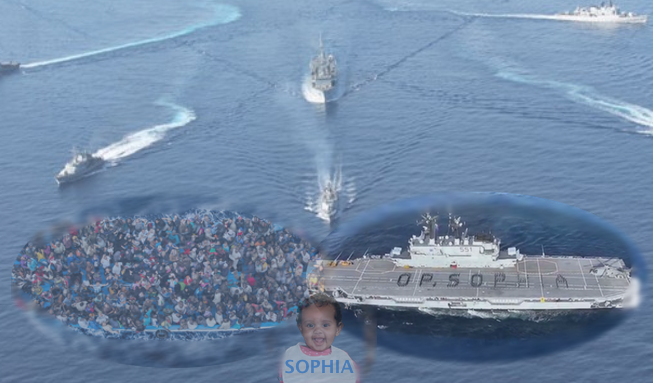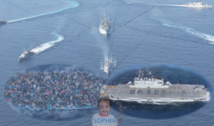Libya's embattled Prime Minister Fayez al-Serraj enjoys United Nations backing and a Turkish force presence, while rival commander Khalifa Haftar has the support of Egypt, the United Arab Emirates and Russia.
Libya has been in turmoil since the 2011 overthrow of dictator Moamer Gaddafi and has become a battleground for rival proxy forces. The issue is seen as key to EU security, after the country became a gateway for migrants trying to reach Europe.
The European Union has pledged to help implement the agreements reached, including possibly dispatching troops under an EU flag to monitor the ceasefire.
Operation Sophia was launched in 2015 to stop human trafficking in the Mediterranean Sea and enforce the UN arms embargo on Libya.
The naval patrols ended last year, however, due to a dispute between Italy's former populist government and other EU capitals on what to do with rescued migrants. The mission still trains the Libyan coastguard.
"Sophia must be dismantled and reassembled in a completely different way because it must be a mission to prevent arms from entering Libya. It must be a mission to monitor the embargo and nothing else," Italian Foreign Minister Luigi Di Maio stressed on Monday.
The revived mission will include new capabilities, Borrell said, noting that details will now be hashed out by military experts.
"The arms embargo has to be controlled not only by sea, because most of the arms go through the desert," Borrell said, pointing to Libya's long land borders. "We can control the sea but we also have to control the land and the air."
This will require satellites and air surveillance, on top of vessels, he noted.
At the same time, Borrell said this did not mean the migration issue will not be addressed. "For sure, any ship in the Mediterranean will be abiding by international law," he said, referring to maritime rules compelling vessels to help anyone in distress.
The issue remains sensitive in Italy, however.
"For a part of the public opinion in Italy, Operation Sophia is related with the migrant problem and only with that," Borrell said, adding that they had to do "important work" to explain that it is being revived to respond to an urgent situation in Libya.
Meanwhile, German Foreign Minister Heiko Maas said the priority was to "turn the fragile ceasefire that we have into a [proper] truce," adding that there would be a further debate on a broad range of instruments.
The ministers are expected to return to the issue when they next meet in a month's time.
The EU has come under fire in the past for its cooperation with the Libyan coastguard, which has been accused of human rights violations.
Speaking in Brussels, Greek Foreign Minister Nikos Dendias - whose country was not invited to the Berlin talks - welcomed the progress made on Sunday and said Athens would support all further steps.
"This is the first time ... that Europe has regained control," his French counterpart Jean-Yves Le Drian said after Monday's talks.
The German government said that the implementation of the peace process in Libya was now up to the warring parties on the ground.
The Berlin peace conference was aimed at supporting the efforts of the United Nations' special envoy for Libya, Ghassan Salame, government spokesman Steffen Seibert said.









 Home
Home Politics
Politics











